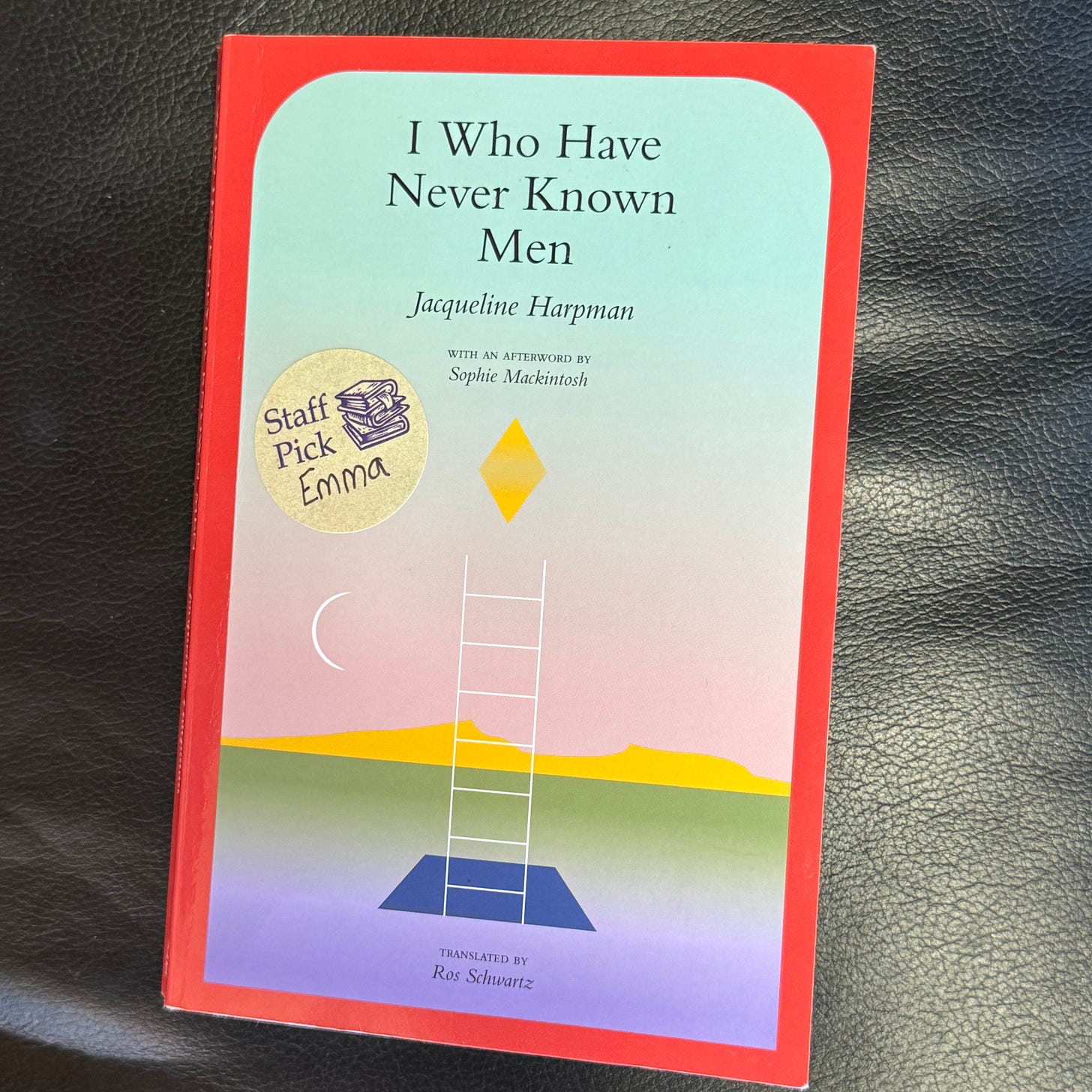I had recently seen (on Substack) a lot of recommendations of I Who Have Never Known Men by Bengian author Jacqueline Harpman, and when I saw it last week at Bookmark in Charlottetown, I thought it was something outside of my usual interest. However, my curiousity was piqued, so I took it to the counter.
Emma, who works at the store, happened to be serving me and we got chatting. As you can see by the sticker, she highly recommended it.
I discovered later that this book has had a bit of attention on #BookTok. That worried me - sorry BookTok folk, but usually when something goes viral there, I don’t end up enjoying it (to be fair, I often have a negative response to winners of major literary awards too…)
I Who Have Never Known Men was published in 1995 and is considered a science fiction novel (like I said - WAY out of my normal choice!) but I would say that’s not exactly right. Yes, it is dystopian, but it remains deeply human as well and I guess I consider science fiction to be less human and more imagination driven. That’s just me. I don’t know if its the world we are living in, in 2025, but I certainly did not find the storyline so surreal that I couldn’t imagine it occurring. Unlikely, yes, but not impossible.
The story is a group of 40 women who are imprisoned in an underground cage. There was an “event” which is not described, but it would seem that it was a catastrophic environmental and political disaster, which has left much of where they inhabit empty. Narrated by the youngest of the women, she is referred to as “the child” by the older women and has no name, despite all the other women having one. They are caged up for several years.
This would be my only complaint about the women - they do not take the time or care, even after they are freed, to give the child a name and, thus, an identity of her own.
One day, a siren sounds and the guards evacuate. Keys were dropped closely enough that the women can unlock the cage and escape. There is no sign of the guards and they leave without taking anything with them. The women navigate their way out of the bunker to find a desolate, empty plain - they’re not even sure they remain on earth.
Of course, they must be on earth because they have oxygen and, eventually, trees and grasslands to build a community within. The bunkers - many scattered across the lands they explore, are powered. So although they don’t appear to work it out, the reader knows they remain somewhere on the earth.
I Who Have Never Known Men is, essentially, a story of survival, female strength and resilience, and a thought provoking contemplation of a planet that has been essentially levelled and devoid of humanity. It looks at how the women maintain theirs, and their sanity, and live lives that are different to those prior to the “event” but are complete in a new context. It considers matriarchy, and how power and wisdom is passed from woman to woman, generation to generation. And, it is a story of love, despite the women probably not considering the bond they share one of love. It is that, in a miriad of ways.
This book does not have chapters, so it’s often difficult to find a spot to stop reading. There are some natural plot points though, so I’d say trust your instinct, if you need to, say, sleep or work!
About a quarter of the way in, I wasn’t sure I wanted to keep reading I Who Have Never Known Men, but I am so glad I did, because it was a fantastic book. It won’t be for everyone, but I think readers with feminist ideals and a concern for the future of our planet will really get something from this novel. I am also grateful that I stepped out of my usual comfort zone to read this - I have to remind myself to do that more regularly.



